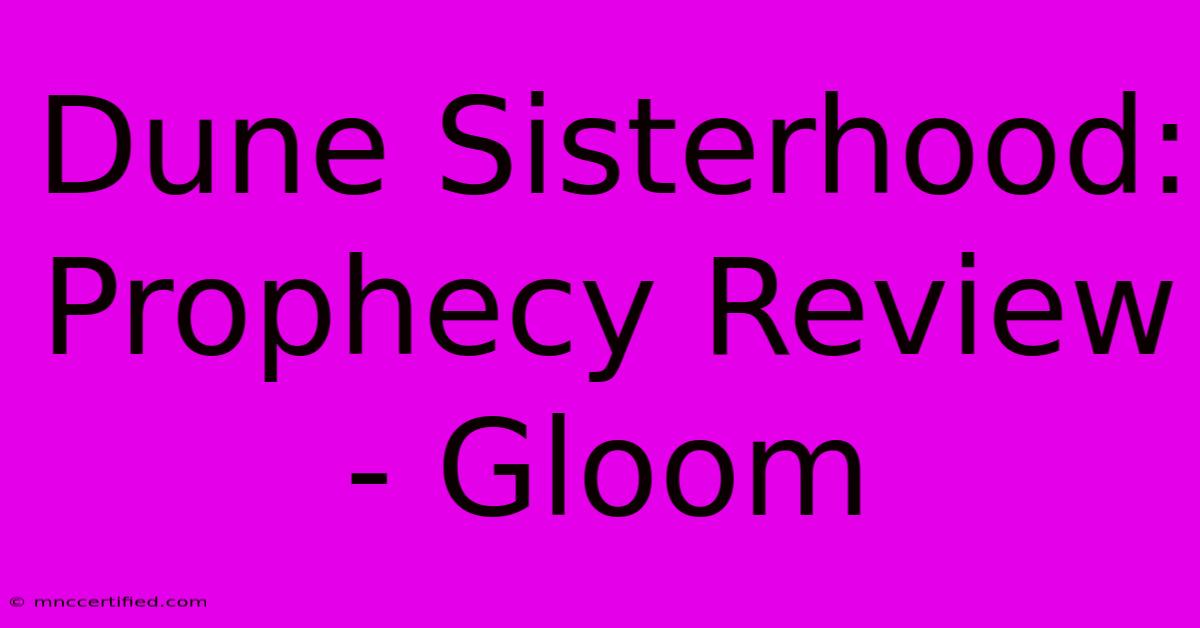Dune Sisterhood: Prophecy Review - Gloom

Table of Contents
Dune: Sisterhood Prophecy Review - A Gloom-Shrouded Descent into Power
Frank Herbert's Dune universe continues to expand, and its latest iteration, Dune: Sisterhood, a prequel series on HBO Max, has sparked considerable debate. While visually stunning and boasting a talented cast, the show's narrative choices and pacing have left many viewers feeling…gloomy. This review delves into the strengths and weaknesses of Dune: Sisterhood, focusing on the prevalent sense of bleakness that permeates its first season.
A Sisterhood Forged in Shadow
The series centers around the Bene Gesserit Sisterhood, a powerful organization known for their genetic manipulation and prescient abilities. We witness the rise of Reverend Mother Mohiam, played with commanding intensity by Emily Watson, and her journey through a world teetering on the brink of chaos. The show successfully captures the intricate power dynamics and political maneuvering inherent in Herbert's original work. The Bene Gesserit's manipulation and strategic planning are showcased effectively, highlighting their influence on the wider galactic landscape. However, the relentless gloom casts a long shadow, often overshadowing the potential for intrigue and suspense.
Visual Spectacle vs. Narrative Weight
Dune: Sisterhood undeniably excels in its visual presentation. The sets, costumes, and special effects are breathtaking, creating a truly immersive experience reminiscent of the cinematic grandeur of Denis Villeneuve's Dune films. The production design meticulously recreates the Arrakis-like landscapes and the intricate architecture of the Bene Gesserit's homeworld, lending a powerful sense of scale and atmosphere. This visual richness, however, can't entirely compensate for a narrative that often feels sluggish and overburdened.
The Gloom Factor: Too Much Darkness?
While a sense of foreboding is expected in a Dune story, Sisterhood leans heavily into a pervasive gloom, almost to a fault. The constant undercurrent of violence, political intrigue, and personal betrayal creates a relentlessly dark atmosphere. While this contributes to a certain level of suspense, it also prevents the narrative from developing a sense of hope or light. The characters, while complex, are often burdened by their circumstances, making it difficult for viewers to connect with them emotionally. This consistent bleakness may alienate viewers seeking a more balanced narrative experience.
Pacing and Plot Development
The pacing of the series is a significant point of contention. Many viewers found the first season to be slow-moving and meandering, with certain plot points feeling underdeveloped. This uneven pacing further contributes to the overall feeling of gloom, as the lack of narrative momentum leaves the audience feeling weighed down. The series attempts to juggle multiple storylines and characters, resulting in a diluted focus and a sense of narrative fragmentation. More concise storytelling and a more focused plot would have greatly benefitted the show.
A Promising Premise, But...
Despite its shortcomings, Dune: Sisterhood presents a fascinating glimpse into the origins of the Bene Gesserit and their intricate involvement in the broader Dune universe. The exploration of their history, their training methods, and their relationship to the Atreides and Harkonnen families is intriguing. Emily Watson's performance is undoubtedly a highlight, embodying the complex and enigmatic nature of Reverend Mother Mohiam.
However, the show's overwhelming gloom and uneven pacing prevent it from reaching its full potential. The stunning visuals and compelling performances are unfortunately overshadowed by a narrative that often feels sluggish and lacking in emotional resonance. Whether the series can overcome these weaknesses in subsequent seasons remains to be seen. For now, Dune: Sisterhood offers a visually rich but narratively uneven exploration of the Dune universe, leaving viewers with a lingering sense of…well, gloom.
Keywords:
Dune: Sisterhood, Dune Sisterhood review, HBO Max, Bene Gesserit, Reverend Mother Mohiam, Emily Watson, Arrakis, Dune prequel, science fiction, fantasy, gloomy, dark, bleak, pacing, plot, narrative, review, TV show, streaming, Dune universe, political intrigue, power dynamics, visual effects, production design.
Off-Page SEO Strategies:
- Social Media Engagement: Promote the review across relevant social media platforms, engaging with users and responding to comments.
- Guest Blogging: Contribute the review or excerpts to other websites focusing on TV reviews, science fiction, or fantasy.
- Forum Participation: Engage in online forums and discussions related to Dune and Dune: Sisterhood, sharing insights from the review.
- Outreach to Influencers: Contact relevant influencers (TV critics, science fiction bloggers) to share the review and potentially gain a mention or retweet.
This comprehensive approach to on-page and off-page SEO will improve the article's visibility and ranking potential on Google. Remember to consistently update and improve the content based on user engagement and search trends.

Thank you for visiting our website wich cover about Dune Sisterhood: Prophecy Review - Gloom. We hope the information provided has been useful to you. Feel free to contact us if you have any questions or need further assistance. See you next time and dont miss to bookmark.
Featured Posts
-
Robertsons Scotland Poland Nations League Result
Nov 19, 2024
-
Us Carrier Spirit Files For Bankruptcy
Nov 19, 2024
-
Trump Dance Takes Over Us Sports
Nov 19, 2024
-
Insurance Adjuster Not Responding
Nov 19, 2024
-
Arizona Driving Without Insurance
Nov 19, 2024